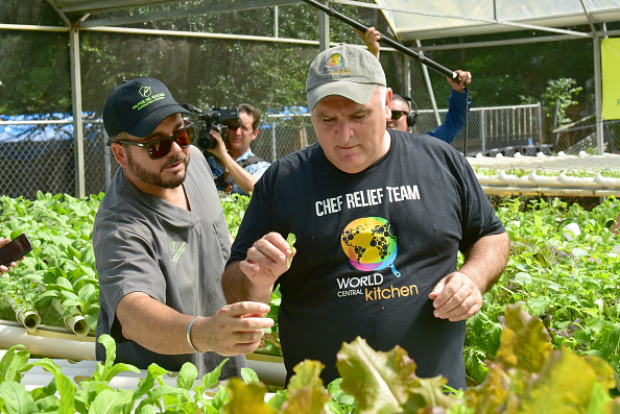If one thing is clear, it’s that food has never been cooler or more popular than it is now. With the rise of cooking shows, celebrity chefs and hot new restaurants springing up daily, food has become more than just a basic human necessity – for some, it’s become a hobby. Chefs are considered near-rockstars with diners happy to fork out a living wage to eat at their restaurants, where some of these wildly-expensive tasting menus go completely overboard, with rare and exotic ingredients sourced from every corner of the earth.
And while there is incredible joy in eating a delicious meal at a beautiful restaurant, there is a tendency for things get a little out of hand and it can be easy to lose sight of what really matters – food. In all its, nourishing, life-giving glory. However, a select group of chefs are beginning to take notice of this, particularly in times of crisis and desperation. And lately, there’s been a growing number of them who are using their platforms and skills to give back and to step up where others can’t, or won’t.
World Central Kitchen
In 2019, the term ‘chef activist’ has all but become synonymous with Spanish-American chef Jose Andres, who has become the living, breathing example of it through his work with World Central Kitchen. Established by Andres as a direct response to the devastating 2010 earthquake in Haiti, World Central Kitchen was initially only intended to set up sanitary cookstoves and preparation areas. However, they soon expanded into supplying food and support to further disaster zones.
The NGO was famously one of the first to respond to deadly Hurricane Maria in Puerto Rico and Dominica in 2017, as well as when Hurricane Harvey tore through Houston last year. Nominated for a Nobel Peace Prize (and would become the first chef ever to win the award), Andres has set up a remarkable organisation that harnesses the skills of professional chefs and enables them to aid and assist others through food. This network not only helps feed people in a crisis, but also works to create jobs and further education through the numerous culinary schools they’ve built. Most recently, Andres went where no one was able to go before by announcing that the organisation would be providing free meals to federal workers ordered back to work during the US government shutdown (who have done so without any pay).
Hungry schoolchildren trump Michelin stars
This stepping up where authorities have failed, seems to be a marker of these activists. In a similar thread, American chef Dan Giusti has turned the American public school feeding system on its head with his company, Brigaid. Serious foodies will recognise Giusti from his time at the helm of Noma, yet his most remarkable body of work is what he did after leaving the iconic Michelin-starred restaurant. Instead of opening his own high-end restaurant (which is what most chefs would do having reached the pinnacle of restaurants), he started a company that focuses on getting professional chefs involved in cooking at schools in underprivileged areas.
It’s a simple strategy, employ a trained, mid-level chef to oversee a school permanently. What this means is that even with the low budgets (Giusti estimates they have about $1.50 to feed each child), these chefs are creating wholesome meals from real ingredients, instead of serving prepackaged, ‘heat-and-eat’ type meals. Currently, he’s feeding nearly 800 schoolchildren at each school a day, and for some of these kids, this is the only meal they’ll eat.
Tackling food waste
In the way that Giusti forces most to rethink what food is and what it means, so too has Massimo Bottura with his approach to food waste. According to the Food and Agriculture Organization of the UN, roughly one-third of the food intended for human consumption is wasted, in a world where 1 in 7 people are starving (an estimate that means 795-million people). This loss translates to about 1.3-billion tonnes of food that would feed over 3-billion people. Bottura’s organisation, Food for Soul, is attempting to tackle this head on as it seeks to fight food waste through encouraging the repurposing of surplus ingredients.
This means that supermarkets can donate any in-date food that they can’t sell and these perfectly edible, albeit slightly bruised or damaged, foods are then turned into nutritious meals and served to underprivileged in soup kitchen-style set ups. The project started in Italy, and has since been established in Brazil, London and even the United States. Not only is this organisation fighting poverty and social exclusion, but it’s got the potential to solve another crisis of the modern world – food waste.
At its core, the activist chef really isn’t such a wild concept and is helping to remind us that, at the end of the day, food is nourishment and a necessity, as well as a basic human right. The fact that these chefs, who have businesses to run, families to look after and their own lives to get on with, are stepping up to try and feed as many people as they possibly can is simply remarkable and we’d all do a little better to try follow in their footsteps.
WATCH: Jamie Oliver launches pop-up cafe in London to highlight food waste
Images via Getty Images

